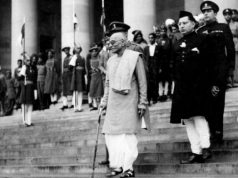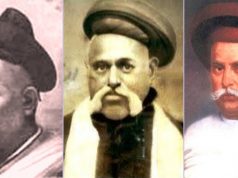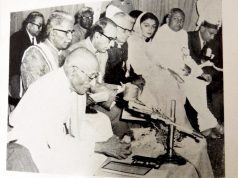This is the third part of a 4-part series. You can read the earlier posts in the series here–
****
Who Owns the State?
That is the question of questions. William H. Chamberlin has, after a decade of personal examination of Soviet life, written:
“A question that far transcends in importance the precise point at which a line may be drawn between public and private enterprise in economic life is whether the people are to own the State or the Sate is to own the people.”(A False Utopia).
Precisely because collectivised economy endangers individual liberty and political democracy, these have to be placed right in the centre of the picture of socialism in the years to come. These are the danger points of socialism. Respect for the human personality is likely to be the field on which the battles of the second half of the twentieth century will rage thickest, and no one has a right to be called a socialist who does not rally to the defence of the Rights of Man.
Ends and Means
If individual liberty and political democracy are as essential a part of socialism as economic equality, it is necessary that the methods of achieving socialism should fit the end. This calls for a repudiation of the Communist slogan that “the end justifies the means”, which more specifically means that in practice everything – lying, deceit, murder – is justified so long as it helps the Communists Party. It also calls for a repudiation of the methods of ruthless class hatred and of the military coup d’etat, and even more of the methods of the ‘liquidation’ of opposition and of the falsification of history resorted to by Stalin. Socialism can only be achieved by clean means and with clean hands. Justice has been well defined as ‘Truth in action”. Without intellectual integrity and adherence to truth, we shall get lost in the woods.
Does this mean that we must fall back into the ranks of the Social Democrats and limit ourselves to legal and constitutional methods alone? If we were in a genuinely democratic country like the Scandinavian States, I would probably answer ‘Yes.’ In so doing, I would only be following Karl Marx, who conceded the possibility of democratic countries like England and America and perhaps Holland achieving a socialist society through purely constitutional changes. But the world by and large is not democratic, and we in this country have not even the glimmerings of democracy and little individual liberty.
New Weapons
The problem for peoples placed like us therefore appears to be one of devising a method of social change which is dynamic and which yet eschews the violence of a coup d’etat and of the dictatorship which must inevitably follow. It is here, I believe, that Mahatma Gandhi has made certain contributions to the development of political thought which every socialist, who wishes to enrich his armory and to devise ever more efficient weapons with which to bring about the social changes which he desires, must carefully study.
Gandhiji’s teachings do not constitute a well-knit system of economic thought, nor need we accept them indiscriminately, but it is pertinent to note that Gandhiji has always stressed the importance of economic equality. “The whole of this (constructive) programme,” he has said, “will be a structure on sand if it is not built on the solid foundation of economic equality.”
There are certain points on which Gandhiji has, I believe, something significant to contribute in so far as the means to achieve our end are concerned. The first of these contributions is the forging of the weapon of mass civil resistance. That form of mass action is limited, not by legalistic formulas or constitutional niceties but by insistence on clean and non-violent methods. The main virtue of this method is not so much that it does not involve a physical extermination of the opponents of change, though that too is in itself valuable, but that it makes it possible to maintain a democratic climate even when contending with undemocratic forces. It shows an understanding of the great truth that democracy is not only a system, but also a habit. Civil resistance is a method which, even when it fails on a particular occasion, avoids, as we know of our own experience, the degeneration and demoralisation that sets in when a violent insurrection is suppressed. If it is once agreed that the violent seizure of power is likely to lead to violence becoming a habit, with the result that the very object for which the revolution is made may get lost on the way, as in Russia, then it is difficult to resist the conclusion that the Gandhian way is on this point better suited to the needs of a country where the ballot box is not available and where bullets must be eschewed. The socialist has long argued that real democracy is impossible without socialism. Now Gandhiji points out that neither democracy nor socialism is possible in any but a non-violent society.
Decentralised Economy
There is another important point to which Gandhiji has called attention. That is the stress laid by him on the decentralisation of economy. This part of his teaching has often been labelled “Back to the Villages,” and has been subjected to a great deal of sharp criticism.
What attitude should Socialists adopt towards Gandhiji’s attitude on this question? Should we regard him as an outmoded crank, fiercely opposed to all machinery and attempting to take us back to a dreary past? If this were really so, then how can we explain Gandhiji’s support to the nationalisation of key industries? “What, I object to is the craze of machinery, not machinery as such,” Gandhji said. “The spinning wheel is itself an exquisite piece of machinery.” So again, writing in the Harijan of 22nd June, 1935, he has said: “If we could have electricity in every village home, I shall not mind villagers plying their implements and tools with electricity.”
“I consider it a sin and injustice to use machinery for the purpose of concentrating power and riches in the hands of the few. Today the machine is used in this way,” Gandhiji wrote in NavaJivan on 20th September, 1925. What socialist can disagree with a word of this?
It would therefore be more to the point to regard Gandhiji’s lack of sympathy with large-scale mechanisation and industrialisation as partly a protest against the capitalist use of the machine and partly a corrective to a tendency which even Western sociologists are now coming to realise is anti-social and undemocratic in its results.
(You can access the original piece here. Visit indianliberals.in for more works by Indian Liberals dating back to the 19th Century.)
Post Disclaimer
The opinions expressed in this essay are those of the authors. They do not purport to reflect the opinions or views of CCS.






